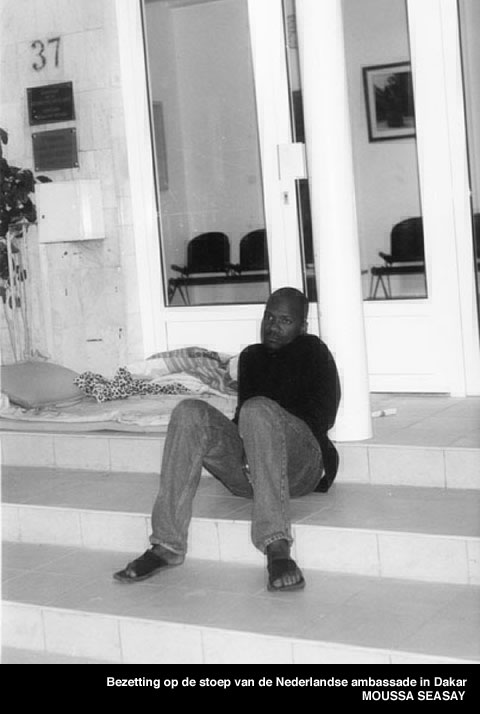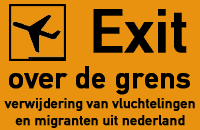over de grens - verwijdering van vluchtelingen en migranten uit Nederland
autonoom centrum, maart 2004
# The Oumar Ba affair
> Three failed attempts> Fourth deportation by Martinair private charter> Mysterious IND mission> Prestige-case.> Ba's experiences after his expulsion> Ba's action at the Duch embassy in Dakar> Ba demands to be taken back to Holland> Injections shouldn't have been applied
Oumar Ba from Sierra Leone fled the civil war raging in his coutry in the late nineties. For a while he lives and works in Senegal as a popular rap- musician. In 1998 he applies for political asylum in the Netherlands. He travels with a false Senegalese passport which he obtained during his stay in that country. Ba's application is turned down by the Dutch, and the Immigration and Naturalisation Service (IND) confines him in a detention centre for foreigners in Ter Apel, until he can be sent back to Senegal. He is kept imprisoned for about nine months. Alarmed by a TV documentary about his imprisonment and the attempt to remove him from the country which involved injecting narcotics, the Autonomous Centre Amsterdam gets in touch with him to support his case in cooperation with the lawyers.
# Three failed attempts
Three times the IND tried to remove him from the country in vain. The first attempt on October 22nd fails because the Senegalese immigration services on the Dakar Airport do not accept the documents the IND produced, among which a 'laissez passer': a single use travel document. This laissez passer the IND obtained from the Senegalese consul after producing a copy of the forged and outdated Senegalese passport Ba used to enter Holland. The consul never meets Ba in person. Much later, the consul tells the Autronoom Centre in a phone conversation he regrets having issued the l.p., as he is convinced that Ba is not Senegalese. This is also what he had told the IND. The second attempt to remove Ba from the country, on November 17th 1999 fails because Ba resists by rubbing his excrements all over his body. Ba is protesting because he refuses to be dumped in Ghana where the flight is headed. The IND still uses the same l.p. .
In the third attempt Ba is lifted from his prison bed and strapped into a straightjacket. Ba resists verbally as he enters the airplane, and addresses fellow travellers about being forcibly removed. In the presence of KLM personnel, a nurse from Medicar - a medical company that accompanies sick air-travellers and also assists the Koninklijke Marechaussee (Kmar, Military Police) and IND escorting foreigners - applies several calming injections to Ba. On board of the KLM aircraft a dozen fellow passengers complain about the violence used, the complainsts are filed in a KLM-report . The pilot orders the Kmar to remove Ba from the aircraft.
# Fourth deportation by Martinair private charter
The fourth attempt by the IND is succesful. On July 19th 2000 Ba is flown to Dakar. His case has become such a matter of prestige that the IND was prepared to charter a private flight with Martinair. The AC criticises this company in a meeting and in a letter. Former managing director Schröder reacts by saying that he had agreed to cooperate with the IND, as they told him that it concerned a criminal. He regretted the deportation and would not have cooperated if he had known the truth. Still Martinair ought to have taken matters into their own hands instead of assisting the expulsion.
# Mysterious IND mission
At various occasions the IND tried to obtain a laisser passez from the Senegalese embassy in Brussels. The request is based on still the same copy of the forged and expired Senegalese passport. The embassy does not accept this copy as sufficient proof of ID, according to them Ba is not Senegalese. The IND also presents a statement declaring the passport Ba used is authentic. This statement has many flaws and a lot of data-entries are not completed. From an article in the Trouw-newpaper about this statement: "The Senegalese Embassy has doubts about the authenticity of the document that the IND brought in." Ba's lawyer in the same article: "The status of this document is not known to me. Normally foreigners can only be expulsed after the embassy of the country of origin issues a temporary travel document, a laissez passer."
To prepare the fourth expulsion attempt, an IND delegation, headed by Rob Baljon travels to Senegal, to make sure Ba will be accepted by the Senegales authorities. Baljon was gouvernor of the Ter Apel expulsion-centre at the time, later on he worked for the Laissez passer-department of the IND. On his trip Baljon, who is remarkably dedicated to Ba's expulsion, is accompanied by an employee of the Dutch Embassy in Dakar. Baljon manages to arrange with chief officer Diouf of the Dakar Airport that Ba will be allowed entry. This time Ba will be able to pass with the same, and by now expired l.p., that was refused earlier. The IND also presents a document stating the authenticity of the Senegalese passport. Everyone wonders how the IND managed to succeed this time. Ba is after all from Sierra Leone and the documents are not valid. Officer Diouf was transferred shortly after. His replacement Mboye wants to investigate the case discretely as there is talk of corruption.
# Prestige-case.
The IND and Baljon want to move Ba to Senegal by all means, although Ba has declared during the asylum-procedure to be from Sierra Leone. Some time after his deportation to Senegal , Ba will turn out to have recieved a SierralLeaones passport by the Sierra-Leonese embassy in Gambia. This is proof of his nationality and shows that IND has unlawfully deported Ba, using wrong documents. All of this has been recorded by a journalist whose documentary was broadcast on Dutch TV. During the asylum procedure in Holland the IND did present Ba to the Sierra Leonese(SL)embassy, but the ambasador did not cooperat and referred them to the Senegalese embassy. For unclear reasons Ba recieved a document declaring he is not from Sierra Leone. In a telephone conversation with the AC one of the employees of the SL embassy states that Ba speaks two SL languages and is possibly a SL citizen. He also says he is irritated to be bothered by the IND with problems of the Dutch authorities.
# Ba's experiences after his expulsion
After the fourth expulsion attempt, in which Ba cooperated, convinced he would be refused entry in Senegal, Ba writes : "I have no doubts that something had been added to my food to make me so sleepy. Probably because of my resistance dag ainst previous expulsion attempts. But this time there was a deal between me and the IND to go to Senegal in order to find out from the Senegalese Immigration whether or not I was Senegalese. If yes, I would be allowed entry, if not, I would be returned to the Netherlands. The arrival in Dakar was at 2pm, five Marechaussee-escorted me on the airplane and told me that a welcome-team was expecting me. Twenty minutes later five Senegalese policemen without uniform arrived and I washanded over to them. . Without interrogation and without seeing the immigration service we went straight to the police. Iwas taken to a cell somewhere close to the airport. After my plane had left they opened my cell and I was informed I had one week to leave the country. Otherwise I would be jailed for six months for travelling with forged papers. The people that told me this, were not the same people that had collected me from the plane, these were wearing uniforms. I think they were paid for this operation. Trying to stay out of trouble I decided to go the official way so they could not lock me up.
# Ba's action at the Duch embassy in Dakar
Within days Ba tries to obtain copies of the identity papers with which he had been removed. He also tries to uncover the agreement that was made between Baljon and officer Diouf at the airport. He demands also that the embassy sends him either to Holland or to Sierra Leone. He reports to the UNHCR and to the Senegalese immigration-service. There he can enlist as a foreigner so he will nt be considered an illegal trespasser in Senegal. Ba makes every effort, partly in the presence of a Dutch journalist, to prove he is not Senegalese. His research in archives and registers concludes that the passport and pass-number on the IND's declaration of 'bien authentique' belonged to a deceased person.
# Ba demands to be taken back to Holland.
Ba finds a lawyer who can helps his case. A reconstruction of his case was broadcast on Dutch national radio. The IND spokesperson reacts by saying the case of Ba is very odd and an investigation will be started. Ba occupies the pavement in front of the Dutch embassy in Dakar to draw attention to his demands. The embassy supplies him with food every day, but have him arrested when he organises a demonstration and media-attention outside their front door. Ba is held for three days, and is then placed in immigrants detention awaiting his removal to...Sierra Leone! Finally he is expulsed to neighbouring Mali and must travel onwards to Sierra Leone by bus. Of course he does not go, since he left that country to escape from the civil war. He ends up in Ghana and asks for permission to stay there. He presently lives there as a musician and radio-presentor.He is still furious at the Netherlands and believes the IND should move him back.
Ba's case is mentioned two years after his expulsion by D. Schoof, head of the IND at the time, in a Telegraaf newspaper article: " a remarkable real life case was the mysterious foreigner 'mr B' "Mr. B was very likely from Africa, but it was hard to tell from which country. Five times he changed nationality, on his own accord, but also due to employees from various embassies. In the end we flew him to Africa and took him to his final destination with a small Cessna-aircraft. He then filed a complaint that we had taken him to the wrong country..."
# Injections shouldn't have been applied
The three injections that were applied when Ba resisted the third attempt to remove him from the country were later on considered unlawful and were disapproved of by the Health Care Inspection :
"The Inspection does not consider it the task of a health care organisation to accompany physically healthy persons whose freedom has been taken from them involuntarily. Particularly due to the fact that expert medical supervision is guaranteed, the opportunity arises to continually stretch the limits to the infringement of personal liberty. ." Inspector Hazelnet-Crans concluded that Medicare needs to review their criteria for taking part in medical escorts. The Van de Haak-Commission formulated as early as 1993 in their report about forced deportation 'Humane expulsion: a paradox? ', that injections are only allowed " when requested by the person concerned, or in case of medical necessity" General Manager of Medicare defended applying the injections in Ba's case arguing that there was a medical necessity, because Ba was in danger of suffocation attempting to free himself from his handcuffs. Ba said he had only resisted verbally.

